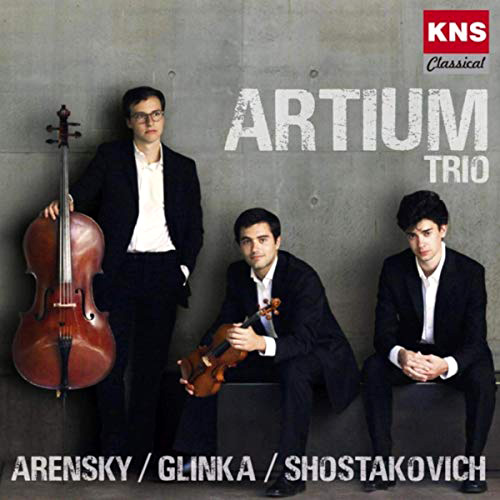
COLLECTIONS

Anton Arensky: Piano Trio No. 1 in D minor, Op. 32 Mikhail Glinka: Drei Russische Lieder Dmitri Shostakovich: Piano Trio No. 1 in C minor, Op. 8
For their debut recording on the KNS Classical label, the Portuguese members of the Artium Trio, Francisco Lima Santos (violin), Pedro Gomes Silva (cello) and Joao Barata (piano), delve deep into the vast ocean that is Russian Chamber Music, and bring to the surface treasures of the repertoire that span three generations of Russian music. On offer from Mikhail Glinka (1804-1857) are Three Russian Songs based on texts by Alexander Pushkin which were eventually transcribed for a trio ensemble by German composer Eduard Hermann. They originate from a time when Russian music did not bear a national identity and therefore very much resemble the stylistic traits of mid-19th century Germany. Nonetheless they do seem to possess a certain level of Slavic mournfulness typical of the region, and come across very well in these chamber arrangements. On the other hand, himself a student of Rimsky-Korsakov, Anton Arensky (1861-1906) inherited his teacher's characteristics and was earmarked to carry on the nationalistic banner but, was so influenced by the strong current of Austro-German-French music spilling everywhere near the end of the 19th century, that his magnificent Piano Trio No. 1 in D minor sounds closer to Brahms or Saint-Saëns than it does Tchaikovsky for example. Nonetheless it is a highly original and strongly passionate example of chamber music from that era. Its trio structure is exemplary as it takes full advantage of all three instruments, something particularly apparent in the beautiful Elegia movement.
Last but not least is the Piano Trio No. 1 in C minor, Op. 8 by Dmitri Shostakovich (1906-1975), written at the age of 16 while convalescing from an operation brought on by tuberculosis, and used merely a year later as his entrance card to the Moscow Conservatory. It may not project as strong an image of "Soviet" life as his later works, but his trademark gestures are already present, as it runs the full gamut of emotions.
For a young formation still in their twenties, the members of the Artium Trio certainly work well together as a perfectly balanced unit. They express the music independently and yet seem to follow each other's rubato and dynamics instinctively and in doing so allow the music to speak freely without imposing their own individualities on it. The hallmarks of any great ensemble and an indication of even greater things to come. KNS Classical, a Spanish label established in 2001, provides a clear and tangible audio recording, with realistic soundstage and depth perspectives.
Jean-Yves Duperron - November 2019